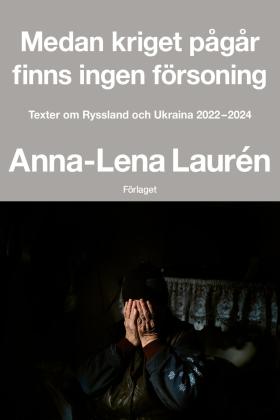
Medan kriget pågår finns ingen försoning. Texter om Ryssland och Ukraina 2022-2024
(While the War Is Ongoing There Is No Reconciliation. Texts on Russia and Ukraine, 2022-2024)
by Anna-Lena Laurén
reviewed by Darcy Hurford
There is a valedictory undertone to While The War Is Ongoing There Is No Reconciliation, and it’s easy to understand why. In April 2023 one of Anna-Lena Laurén’s colleagues contacted her to ask if she’d read what the Russian embassy in Stockholm had written about her. On Facebook she found an article that claimed she was spreading lies, acting like a McCarthyist, lacking in expertise and, most crucially, spreading fake news. The following morning she and her daughter packed their things in the car and drove to Helsinki. Her renewed accreditation as a journalist, due to be granted a fortnight later, never arrived.
It came as no surprise. Laurén had seen the same thing happen to colleagues and knew it was just a question of time before she would also have to leave Russia. The accusation that she was spreading fake news was her cue: when Russia attacked Ukraine a law was introduced that meant foreigners could be imprisoned for to up to fifteen years for spreading fake news about the Russian authorities or military.
The departure from Russia comes around half-way through While the War Is Ongoing. The book brings together articles originally published in the newspapers Dagens Nyheter (Sweden) and Hufvudstadsbladet (Finland), beginning on 22 February 2022 and ending in August 2024, as well as five new texts previously unpublished. They are all fairly short (typically three or four pages), analysing a whole range of topics: from Russian society to life on the Ukrainian front to the corrosive effect of propaganda to the experience of learning Ukrainian. Two texts concern Alexei Navalny. Writing about the crowds that attended his funeral, Lauren notes they show that Russia isn’t the completely apathetic country it’s depicted as, before adding: ‘The irony is surely that if all these people had had the courage to go out and demonstrate for Navalny while he was still alive then the chances of him surviving would have been greater.’
The contradictions in the way people in Russia think are a recurring theme in this collection. Laurén knows lots of people and is interested in getting them to articulate their thought processes. One reason for this is simply that she lived in Russia for so long and built up a network of acquaintances. Another, and one which makes her so well placed to see how Russian society functions, is that she was also bringing up a child there at the same time. Having a child, having to take them to school and after-school activities has the effect of bringing you into contact with a whole range of people you might not otherwise have anything to do with. Her daughter goes horse riding – that one hobby alone yields all sorts of interesting conversations with the instructor and other parents. The riding instructor is aware it has become impossible to get saddles from Kyiv, yet can’t seem to acknowledge that anything is happening in Ukraine. Lauren is also very clear-eyed about the difference between her as a Finn and the Russians around her: ‘I’m fascinated by old empires because they’re multicultural, old-fashioned, and because their wealth of historical traumas, perceptions of identity and blind spots constantly force me to define who I am. […] But I’m from a small democratic country, raised in an egalitarian tradition. I am never going to accept the idea of the right of might as a given.’
The second half of the book focuses more on Ukraine. Lauren lives in Kyiv for nine months, travelling around to report from Bakhmut, Lviv, Kherson and other places. She’s there to report on the war, but also on the details of daily life and the stark differences within the country. Even if life in Kyiv involves the sound of anti-aircraft defence and planning social events around power cuts, Lauren comments that ‘it’s often hard to imagine that the war exists’, later travelling out to regions near the front where things are very different.
It goes without saying that events have moved on since the completion of this book and will keep doing so. That’s inevitable. The value of While The War Is Ongoing is the way it combines insight and analysis of the countries involved in the conflict and the developments so far and does it so lucidly.

Medan kriget pågår finns ingen försoning
Förlaget, Finland and Norstedts, Sweden
268 pages
Foreign rights: held by the author
Anna-Lena Laurén was Russia correspondent for the Swedish-language dailies Dagens Nyheter and Hufvudstadsbladet and now reports for them from Germany. Her previous books include Ukraina – gränslandet (Ukraine – the Borderland, reviewed in SBR 2016:1) and Sammetsdikaturen (The Velvet Dictatorship, a translated extract from which appeared in SBR 2022:1).
